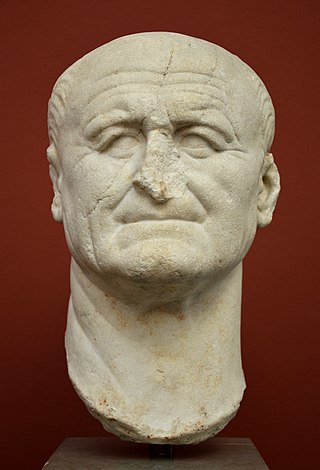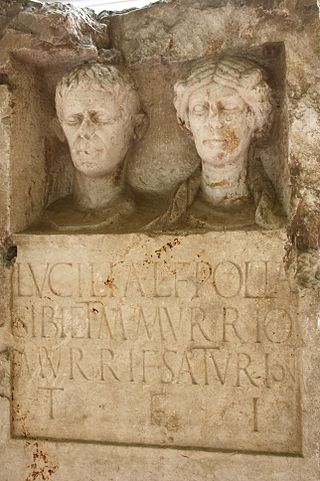Related Research Articles

Vespasian was Roman emperor from 69 to 79. The last emperor to reign in the Year of the Four Emperors, he founded the Flavian dynasty, which ruled the Empire for 27 years. His fiscal reforms and consolidation of the empire brought political stability and a vast building program.

AD 79 (LXXIX) was a common year starting on Friday of the Julian calendar. At the time, it was known as the Year of the Consulship of Titus and Vespasianus. The denomination AD 79 for this year has been used since the early medieval period, when the Anno Domini calendar era became the prevalent method in Europe for naming years.

The 70s was a decade that ran from January 1, AD 70, to December 31, AD 79.
AD 72 (LXXII) was a leap year starting on Wednesday of the Julian calendar. At the time, it was known as the Year of the Consulship of Vespasian and Titus. The denomination AD 72 for this year has been used since the early medieval period, when the Anno Domini calendar era became the prevalent method in Europe for naming years.

Gaius Plinius Secundus, called Pliny the Elder, was a Roman author, naturalist, natural philosopher, naval and army commander of the early Roman Empire, and a friend of the emperor Vespasian. He wrote the encyclopedic Naturalis Historia, which became an editorial model for encyclopedias. He spent most of his spare time studying, writing, and investigating natural and geographic phenomena in the field.

Aulus Persius Flaccus was a Roman poet and satirist of Etruscan origin. In his works, poems and satires, he shows a Stoic wisdom and a strong criticism for what he considered to be the stylistic abuses of his poetic contemporaries. His works, which became very popular in the Middle Ages, were published after his death by his friend and mentor, the Stoic philosopher Lucius Annaeus Cornutus.
Gaius Caesius Bassus was a Roman lyric poet who lived in the reign of Nero.
Gaius Valerius Flaccus was a 1st-century Roman poet who flourished during the "Silver Age" under the Flavian dynasty, and wrote a Latin Argonautica that owes a great deal to Apollonius of Rhodes' more famous epic.

The gens Lucilia was a plebeian family at ancient Rome. The most famous member of this gens was the poet Gaius Lucilius, who flourished during the latter part of the second century BC. Although many Lucilii appear in Roman history, the only one known to have obtained any of the higher offices of the Roman state was Lucilius Longus, consul suffectus in AD 7.
Titus Calpurnius Siculus was a Roman bucolic poet. Eleven eclogues have been handed down to us under his name, of which the last four, from metrical considerations and express manuscript testimony, are now generally attributed to Nemesianus, who lived in the time of the emperor Carus and his sons. The separate authorship of the eclogues of Calpurnius and Nemesianus was established by Haupt.
Bassus is a Latin adjective meaning "thick, fat, stumpy, short" and may refer to:
The gens Aponia was a Roman family during the later Republic, and the 1st century of the Empire. The gens is known from only a few individuals.
Sextus Vettulenus Cerialis was a Roman senator and military commander, the 1st legate of Judaea. He was an early supporter of Vespasian, who appointed Cerialis suffect consul in either 72 or 73.
The gens Catia was a plebeian family at Rome from the time of the Second Punic War to the third century AD. The gens achieved little importance during the Republic, but held several consulships in imperial times.
Pompeius Silvanus, fully Marcus Pompeius Silvanus Staberius Flavinus or Flavianus, was a Roman senator who was consul twice.
Claudius Apollinaris was a man of ancient Rome who succeeded Sextus Lucilius Bassus as the commander, or praefectus classis, of Lucius Vitellius's fleet at Misenum, when Bassus defected to Vespasian's side in the year 70 AD. Apollinaris himself soon defected to Vespasian as well, and he escaped with six galleys.

The gens Herennia was a plebeian family at ancient Rome. Members of this gens are first mentioned among the Italian nobility during the Samnite Wars, and they appear in the Roman consular list beginning in 93 BC. In Imperial times they held a number of provincial offices and military commands. The empress Herennia Etruscilla was a descendant of this gens.

The gens Plautia, sometimes written Plotia, was a plebeian family at ancient Rome. Members of this gens first appear in history in the middle of the fourth century BC, when Gaius Plautius Proculus obtained the consulship soon after that magistracy was opened to the plebeian order by the Licinio-Sextian rogations. Little is heard of the Plautii from the period of the Samnite Wars down to the late second century BC, but from then to imperial times they regularly held the consulship and other offices of importance. In the first century AD, the emperor Claudius, whose first wife was a member of this family, granted patrician status to one branch of the Plautii.
Lucius Annius Bassus was a Roman senator of the early Roman Empire, whose known career flourished under the reign of Vespasian. He was suffect consul in the nundinium of November to December AD 70 as the colleague of Gaius Laecanius Bassus Caecina Paetus.
References
- This article incorporates text from a publication now in the public domain : Chisholm, Hugh, ed. (1911). "Bassus, Saleius". Encyclopædia Britannica . Vol. 3 (11th ed.). Cambridge University Press. p. 498. The Siculus attribution cites J. Held, De Saleio Basso, 1834.